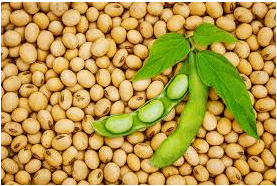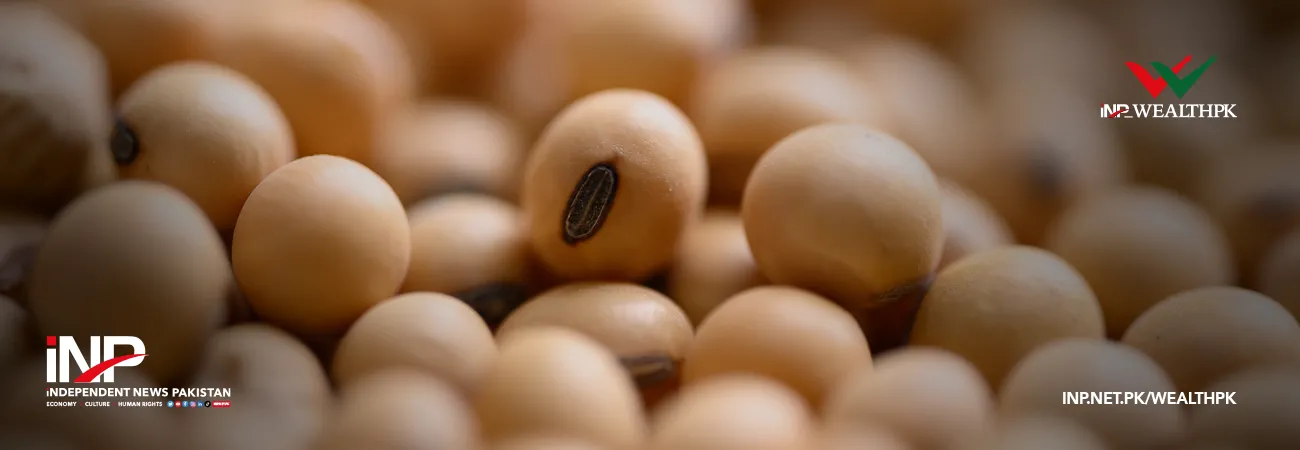INP-WealthPk
Muhammad Luqman
Pakistan’s long-standing ambition to achieve self-sufficiency in soybean production is finally moving closer to reality, as local scientists have developed the country’s first climate-smart, determinate-type soybean varieties capable of thriving in Punjab’s scorching summer temperatures of up to 45°C — a feat never accomplished before.
“Soybean is typically grown in regions with mild climates, such as the United States, but we have successfully developed varieties that can grow under harsh weather conditions like those of Punjab,” said Dr. Hafiz Saad Bin Mustafa, Principal Scientist at the Oilseed Research Institute (ORI), Faisalabad.
Speaking to Wealth Pakistan, Dr. Saad said the ORI — a division of the Ayub Agricultural Research Institute (AARI) — has been working to adapt soybean to Punjab’s environment since the 1980s. “It has taken nearly four decades of persistent research to translate this dream into reality,” he said.
He noted that the newly developed varieties outperform all earlier attempts made by various research institutions that struggled to integrate soybeans into Pakistan’s agricultural system. So far, the institute has developed three soybean varieties — Super Soybean, AARI Soybean, and Faisal Soybean — with four additional lines currently under development to further expand adaptability across the province.
Soybeans, a high-protein legume containing 40% protein and 18–22% edible oil, are widely used in the food and feed industries globally. Its cultivation in Pakistan, Dr. Saad said, could significantly reduce dependence on imported soybean meal and oil, major components of the poultry, livestock, and edible oil sectors.
He identified the most suitable areas for soybean cultivation in Punjab as Sahiwal, Okara, Lahore, Sheikhupura, Rawalpindi, Jhelum, and Sargodha, emphasizing that “soybean production can meet the growing domestic demand across edible oil, poultry, fisheries, and livestock sectors.”
“Being a leguminous crop, soybean improves soil fertility by fixing nitrogen and enriching organic matter,” he explained. “Its inclusion in crop rotation will enhance soil health and sustainability in Pakistan’s agriculture.”
Dr. Saad urged the government to involve private industry, especially poultry and feed manufacturers, in developing a national soybean policy to ensure coordinated growth. “Contract corporate farming could be the most effective model to make soybean cultivation profitable for farmers,” he added.
According to him, with commercial-scale cultivation and a focused national strategy, Pakistan could cut soybean imports by up to 50% within five years, targeting local production of 3 million tons. As these new varieties are non-GMO, they also carry potential for export to international markets.
Industry Response
Stakeholders have welcomed the scientific breakthrough but remain cautious about its commercial viability. “As soybean competes with wheat and maize, its cost-benefit ratio must exceed that of existing staple crops,” said Ebadur Rehman Khan, an agriculture economist and director at Farmers Associates Pakistan (FAP).
Speaking to Wealth Pakistan, he cautioned that if soybean cultivation expands at the expense of wheat, Pakistan could face a shortage of its main staple crop. “It’s a delicate trade-off that requires careful planning,” he said, suggesting that the government bring barren or underutilized lands under soybean cultivation instead.
He further emphasized that procurement guarantees are critical for sustained adoption. “Every grain of soybean must be purchased by either the government or private sector to ensure farmer confidence,” he said, recalling the “bitter experience” of sunflower growers in Punjab, who faced market collapses due to lack of buyers.
Former Chairman of the Pakistan Poultry Association, Dr. Abdul Karim Bhatti, also called for a long-term policy to ensure stable supply for the poultry feed industry.
“Inconsistent availability of soybean meal forces poultry producers to rely on maize- or wheat-based feed, which is less nutritious,” he said. “A sustained local supply of soybeans can transform feed quality and reduce input costs.”
With the successful development of heat-tolerant, high-yield soybean varieties, experts believe Pakistan is on the brink of a major agricultural milestone — one that could reshape its edible oil landscape and strengthen its food security in the years ahead.

Credit: INP-WealthPk













